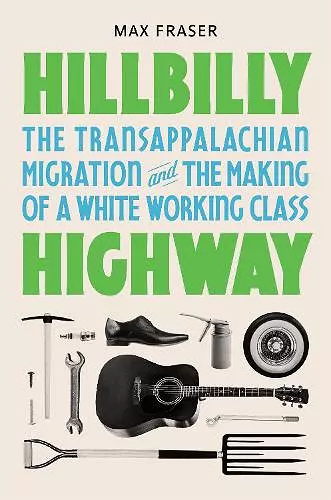Hillbilly Highway
The Transappalachian Migration and the Making of a White Working Class
Format:Hardback
Publisher:Princeton University Press
Published:21st Nov '23
£28.00
Supplier delay - available to order, but may take longer than usual.
This hardback is available in another edition too:
- Paperback£16.99(9780691253497)

“The best book to explain the world J. D. Vance came from is Max Fraser’s Hillbilly Highway.”—Jessica Wilkerson, author of To Live Here, You Have to Fight: How Women Led Appalachian Movements for Social Justice
Over the first two-thirds of the twentieth century, as many as eight million whites left the economically depressed southern countryside and migrated to the booming factory towns and cities of the industrial Midwest in search of work. The "hillbilly highway" was one of the largest internal relocations of poor and working people in American history, yet it has largely escaped close study by historians. In Hillbilly Highway, Max Fraser recovers the long-overlooked story of this massive demographic event and reveals how it has profoundly influenced American history and culture—from the modern industrial labor movement and the postwar urban crisis to the rise of today’s white working-class conservatives.
The book draws on a diverse range of sources—from government reports, industry archives, and union records to novels, memoirs, oral histories, and country music—to narrate the distinctive class experience that unfolded across the Transappalachian migration during these critical decades. As the migration became a terrain of both social advancement and marginalization, it knit together white working-class communities across the Upper South and the Midwest—bringing into being a new cultural region that remains a contested battleground in American politics to the present.
The compelling story of an important and neglected chapter in American history, Hillbilly Highway upends conventional wisdom about the enduring political and cultural consequences of the great migration of white southerners in the twentieth century.
"Honorable Mention for the Frederick Jackson Turner Award, Organization of American Historians"
"A Choice Outstanding Academic Title of the Year"
"Fraser, a scholar of labor history at the University of Miami, corrects several misconceptions. . . . Many more poor white migrants left debt-burdened farms, dead-end jobs and shuttered mills, and ventured north on the ‘hillbilly highway’ to settle in poor white ghettoes such as Chicago’s Uptown, Muncie’s Shedtown and Dayton’s East End. . . . Fraser also challenges writers who blame poor white southerners for the rise of the anti-union right in the North. . . . The very humane stories in [Hillbilly Highway] could be just the thing to break the ice."---Arlie Russell Hochschild, New York Times
"In an engaging, richly detailed volume that stretches from patterns of land use to shifting class politics to the evolution of country music, Fraser traces the migration and its economic, social, cultural, and political consequences. He does not use the word ‘hillbilly’ in a derogatory sense but to illustrate the great variety of meanings neighbors and contemporaries attached to it. He sees the marginalization of hillbilly culture and politics as a symptom, rather than a cause, of the conservative turn in post-1960s politics."---Jessica T. Mathews, Foreign Affairs
"Hillbilly Highway has made a valuable contribution to our understanding of a forgotten and consequential phenomenon in midwestern history, a movement of people across regions that transformed key midwestern cities in what would become the most coveted of swing states and may well have influenced the political evolution of the country."---Colin Woodard, Washington Monthly
"[Hillbilly Highway] presents interesting conflicts between the rural transplants desperate for work and the employers who eagerly sought to employ them in the booming industrial centers. . . . The book benefits greatly from an extensive bibliography and chapter notes including government studies, industry reports, union records, oral histories and cultural notes such as the importance of country music."---Steven Davis, New York Labor History Association
"A thoughtful and empathetic exploration of worker mobility, the structural constraints that white Southerners worked to overcome, and the social ostracism that ultimately led to their political alienation. . . . This story has been told many times in many ways by many people but, in the case of Hillbilly Highway, it has never been told so well."---Phillip J. Obermiller, Appalachian Journal
"Fraser explores a thousand nooks and crannies of life . . . showing how a mining town dies or how families can’t survive on a small farm anymore. He brings this to life with the words of those he has interviewed, tearing down Appalachian stereotypes as he goes. . . . The breadth and depth of Fraser’s scholarship is impressive."---Michael E. Maloney, Journal of Urban Affairs
"Fraser not only provides a passionate account of the migration experience for individuals, but a brilliant analysis of the impact of that migration on working-class politics and culture in modern America. . . . Good social history connects the past and the present and the lived experience of its subject with that of its readers. Hillbilly Highway accomplishes both goals while offering timely insight into the political and cultural conflicts of contemporary America. . . . This is good history, beautifully written, well researched, and carefully argued. It should become a staple in regional, labor, and American political history."---Ronald D. Eller, Register of the Kentucky Historical Society
"Essential." * Choice *
ISBN: 9780691191119
Dimensions: unknown
Weight: unknown
336 pages